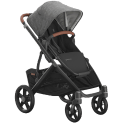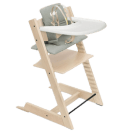
How Often Should You Bathe Your Newborn?
Bathing a squirmy newborn can feel like risky business: they’re slippery, they’re floppy, and you may be worried you’re not doing it right (hashtag parenting mantra). But with a little practice and understanding the basics of newborn bath time, you’ll be a pro in no time. Whether you’re a brand new parent or parent to a couple of kiddos, you probably still have a few questions about bath time, starting with, “how often should you bathe your newborn?”.
Are There Benefits to Delaying Your Newborn’s First Bath?
Both the American Academy of Pediatrics (AAP) and the World Health Organization (WHO) recommend delaying your baby’s first bath for the first twenty-four hours after birth. If waiting a full day isn’t possible, delaying the bath for just six hours still benefits your newborn’s overall health. Some of the advantages associated with delaying your newborn’s first bath include:
- Better bonding. The first hour of direct skin-to-skin contact after your baby is born is known as the “golden hour”. Delaying a newborn’s first bath allows for uninterrupted skin-to-skin contact between the baby and any other caregivers, which helps promote bonding, stabilizes the baby’s blood sugar, and regulates their heart rate.
- Improved breastfeeding success. Interrupting skin-to-skin contact for a bath can negatively impact breastfeeding. Research shows that delaying a bath for just twelve hours increases hospital breastfeeding success compared to babies that were bathed within the first few hours following delivery.
- Temperature regulation. Even healthy full-term newborns aren’t able to maintain their body temperature in cold environments. Newborns who are bathed too soon have an increased risk for hypothermia.
- Healthier skin. Vernix, a waxy coating that covers a newborn’s skin before birth, has antibacterial properties and keeps a newborn’s delicate skin moisturized and protected from irritation and dryness.
It’s more likely than not that your hospital or birthing center is aware of the AAP guidelines for delaying your newborn’s first bath, but if you have any concerns, you can always reach out to your healthcare provider or hospital staff to make sure you’re on the same page.
When Should You First Bathe Your Newborn at Home?
The AAP recommends waiting until the umbilical stump heals before giving your newborn their first tub bath at home—that usually takes about two weeks. Similarly, circumcision incisions should be fully healed before bathing your little one, as well.
Until then, you’ll want to stick to sponge baths to keep your baby clean (avoid bathing in tubs all together). Once you’re both ready to tackle your first bath routine, keep washing up gentle and quick until your baby has gotten used to it.
- Fill a bowl with warm water.
- After removing your baby’s clothes, lay her on a towel on a flat surface or in an infant tub (even with a tub, laying a towel under your baby can help keep her in place). Cover her with another towel to keep her warm.
- Wash small sections at a time, beginning with the face. Dip a washcloth into the warm water, lifting only the part of the towel where you are washing.
- Be careful to avoid the umbilical cord area.
Once the umbilical stump has healed, you can begin giving your newborn a proper bath in a baby bathtub, a sink, or in the tub with you. Always ensure that the water temperature is comfortable—not too hot and not too cold (it should feel comfortable on your wrist). And pay special attention to properly supporting your baby’s head and neck during bathtime, they’re still very wobbly.
Remember to keep the room warm and draft-free during the bath, and have your bath supplies within reach. Bath time can be a special bonding experience for both you and your newborn, so relax and enjoy this sudsy time together. The more fun you have at bath time, the more your little one will look forward to it in the future.
Related: Our Guide to Baby’s First Bath
How Often Does Your Newborn Need a Bath?
Babies do not need a bath every day—in fact, bathing too frequently can dry out sensitive newborn skin and cause irritation (similarly, use bath gels and shampoo sparingly). As long as you make sure to keep those dirt-prone areas clean (diaper area, face and neck, hands, etc.), you will only need to bathe your baby two or three times a week. And don’t worry about shampooing during every bath, either (a real hair wash with shampoo can be done just weekly).
What Are the Best Bath Products to Use with Newborns?
We all know that newborns smell delicious all on their own, so look for mild, fragrance-free, pH-neutral bath gels, shampoos, and lotions that minimize the risk of irritation or an allergic reaction. Because babies have super sensitive skin, make sure to look for toiletries made specifically for infants without any additives or harsh chemicals.
Tips for Bathing Your Newborn
Ready to splish splash? Our tips for getting started:
- Establish a routine. A bath time routine will help set up your baby’s natural clock and reinforce that it’s ‘sleepy time.’ Dim the lights and get your little one ready for Snoozetown.
- Get your bath supplies together. Have everything you’ll use during bath time organized and within arm’s reach. The essentials include baby shampoo and body wash (or a product that does both), a couple of baby washcloths (they’re smaller and easier to use), a plus towel or two, baby lotion, and a baby bath tub. It’s also super convenient to have a diaper, diaper ointment, and a fresh outfit ready for after the bath.
- Basic bath time safety. Babies under two months old can’t regulate their body temperature and lose heat very quickly. Make sure you’re bathing your baby in a warm room, and that the water temperature is lukewarm (test with your elbow or wrist—they’re more sensitive than your fingertips). On the flipside, make sure to set your water heater below 120 degrees to prevent scalding. Fill your tub or sink with just enough water to cover the bottom of your baby’s body, and always keep one hand on that squirmy tummy.
- Newborns don’t need bath toys. Infant baths should be short and sweet (just long enough to get the job done). Save the toys for babies who have the strength and motor control to really engage in play.
- Use cleansing products sparingly. Soaps and cleansers will dry out your baby’s skin, so make sure to use them sparingly. As long as you are thoroughly cleaning your newborn’s diaper area during changes and managing spit-up, there’s usually no need to fully lather your little one up.
- Apply lotion after baths. To keep your baby’s skin from drying out, make sure to apply a fragrance-free hypoallergenic lotion after you get your baby dried off before getting dressed.
Finding What’s Right for You
Albee Baby is the oldest family-owned specialty baby shop in the US, and we pride ourselves on providing our customers with the best assortment of baby products anywhere, at fair prices, always. We’re committed to being an inclusive resource for parents, and hope you’re feeling empowered to find the right car seat for your family. Still have questions? Feel free to contact our baby gear experts at 877.692.5233 or by email at info@albeebaby.com.
 Car Seat Sale
Car Seat Sale
 Stroller Sale
Stroller Sale
 Home Sale
Home Sale
 Feeding Sale
Feeding Sale
 Activity & Entertainment Sale
Activity & Entertainment Sale
 Bath & Potty Sale
Bath & Potty Sale






 Car Seats
>
Car Seats
>
 Strollers
>
Strollers
>
 Cribs
Cribs
 High Chairs
High Chairs
 Baby Carriers
Baby Carriers
 Travel Cribs & Playards
Travel Cribs & Playards
 Wagons
Wagons
 Home
>
Home
>
 Bath & Potty
>
Bath & Potty
>
 Diaper Bags & Backpacks
Diaper Bags & Backpacks
 Toys
>
Toys
>
 Gifts
>
Gifts
>
 Clothing
>
Clothing
>

















 Infant Car Seats
Infant Car Seats
 Convertible Car Seats
Convertible Car Seats
 All-in-One Car Seats
All-in-One Car Seats
 Booster Car Seats
>
Booster Car Seats
>
 Travel Systems
Travel Systems
 Car Seat Accessories
Car Seat Accessories
 Single Strollers
Single Strollers
 Double Strollers
Double Strollers
 Single-to-Double Strollers
Single-to-Double Strollers
 Lightweight & Compact Strollers
Lightweight & Compact Strollers
 Jogging Strollers
Jogging Strollers
 Bicycle Trailers & Child Seats
Bicycle Trailers & Child Seats
 Stroller Accessories
Stroller Accessories
 Stroller Frames
Stroller Frames



































